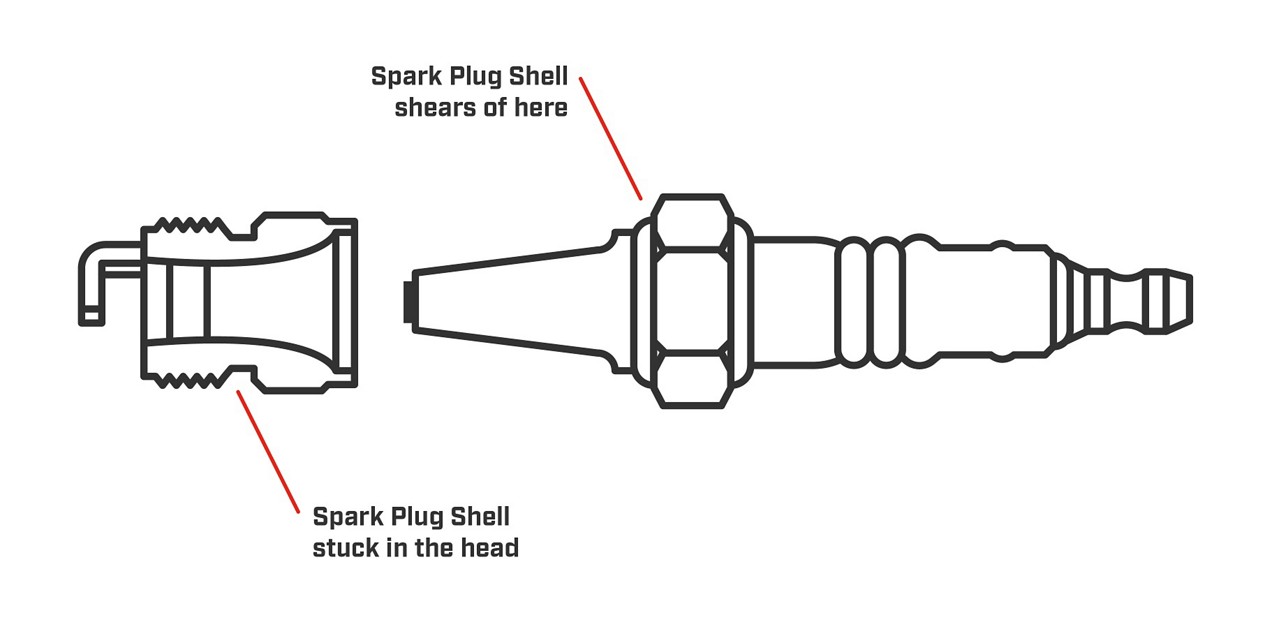Removing a stuck spark plug can be tricky. But with the right steps, you can do it safely.
Spark plugs are vital for your engine. When they get stuck, it can cause trouble. You might worry about breaking the plug or damaging your engine. But don’t worry! With some patience and the correct tools, you can remove it.
This guide will walk you through the process. You’ll learn how to handle a stuck spark plug without causing harm. Keep reading to find out the best steps to take. Your car will thank you for it!
Preparation And Safety
Ensure the engine is cool before attempting to remove a stuck spark plug. Use proper tools to avoid damage and injury. Always wear safety glasses and gloves for protection.
Gathering Tools
First, gather all the tools. You need a ratchet, a spark plug socket, and a breaker bar. Also, get some penetrating oil and a clean rag. These tools will help you remove the stuck spark plug.
Wearing Protective Gear
Always wear protective gear. Gloves protect your hands. Safety glasses protect your eyes. Working on cars can be dirty. Protect yourself to stay safe.

Credit: www.reddit.com
Initial Inspection
First, clean the area around the spark plug. Use a brush to remove dirt and debris. This helps prevent anything from falling into the engine. Debris around the spark plug can cause problems. It is important to keep the area clean. A clean area makes the job easier. You should always start with a clean workspace.
Look at the spark plug closely. Check for any damage. A damaged spark plug is harder to remove. See if it is rusted or worn out. If it looks rusty, it might be stuck. Look for any cracks or chips. These signs mean it needs special care. Assessing its condition helps plan the next steps.
Applying Penetrating Oil
Penetrating oil is important for loosening a stuck spark plug. WD-40 or PB Blaster are good choices. Read labels to ensure they are suitable for metal parts.
Clean the area around the spark plug. Apply the oil generously. Let it soak for at least 15 minutes. This helps the oil penetrate and loosen the rust or dirt. Repeat the process if needed.

Credit: www.youtube.com
Using Heat
A heat gun helps in loosening a stuck spark plug. Warm up the area around the spark plug. Do not focus the heat directly on the plug. Move the heat gun back and forth to avoid damage. Heat the area for about two to three minutes. This makes the metal expand and easier to remove the plug.
Safety is important when using a heat gun. Wear safety gloves to protect your hands. Use safety glasses to protect your eyes. Keep a fire extinguisher nearby. Work in a well-ventilated area. Avoid flammable materials near your workspace. Always turn off the heat gun after use. Let the area cool before touching the spark plug.
Leveraging Torque
Removing a stuck spark plug requires leveraging torque. Apply a penetrating oil and let it sit. Use a wrench to turn the plug slowly and carefully.
Using A Torque Wrench
A torque wrench helps you apply the right amount of force. It ensures you do not damage the spark plug. You need to turn the wrench slowly and steadily. This helps to avoid breaking the spark plug.
Avoiding Over-tightening
Over-tightening can make the spark plug get stuck. Always check the tightening specifications of your vehicle. Use the torque wrench to apply the right pressure. This will help avoid issues in the future.
Tapping Method
To remove a stuck spark plug, try the tapping method. Gently tap the spark plug with a hammer. This can loosen debris and rust, making it easier to remove.
Tools Required
- Socket wrench
- Spark plug socket
- Penetrating oil
- Rubber mallet
Step-by-step Guide
Ensure the engine is cool. Spray penetrating oil around the spark plug. Wait for 5-10 minutes. Place the spark plug socket on the wrench. Attach it to the spark plug. Gently tap the wrench with a rubber mallet. This helps break the rust or debris. Turn the wrench counterclockwise. If the plug resists, stop and spray more oil. Repeat tapping and turning until the plug loosens. Do not force the plug. This can damage the threads. Once loose, remove the spark plug by hand.
Using Extractors
Different extractors help remove stuck spark plugs. Some common types include screw extractors, bolt extractors, and socket extractors. Screw extractors are small and fit inside the spark plug. Bolt extractors grip the outside of the plug. Socket extractors combine both methods. Choose the best type for your situation.
First, clean the area around the spark plug. Then, attach the extractor. Turn the tool slowly. Apply even pressure to avoid breaking the spark plug. If it is tight, use a lubricant. This can help loosen the plug. Keep turning until the spark plug is free.

Credit: www.championautoparts.com
Preventive Measures
Regular maintenance is key to prevent stuck spark plugs. Check your spark plugs regularly to avoid issues. Clean the area around the spark plug. Dirt can cause them to stick. Use the right tools. It helps in proper installation and removal.
Apply a small amount of anti-seize compound to the threads. This prevents them from sticking. Avoid over-tightening the spark plugs. Tighten them to the recommended torque. This prevents damage and sticking.
Choose quality spark plugs for your vehicle. Quality spark plugs last longer. They perform better and are less likely to stick.
Copper spark plugs are affordable but wear out quickly. Platinum and iridium spark plugs last longer. They offer better performance. Always check your vehicle’s manual for recommendations. Using the right type of spark plug is crucial.
Conclusion
Removing a stuck spark plug can be challenging, but it’s doable. Follow the steps carefully. Use the right tools and be patient. Safety comes first, so wear gloves and eye protection. Regular maintenance helps prevent stuck spark plugs in the future.
Seek professional help if needed. Proper care keeps your engine running smoothly. Don’t ignore signs of trouble. Happy driving!
